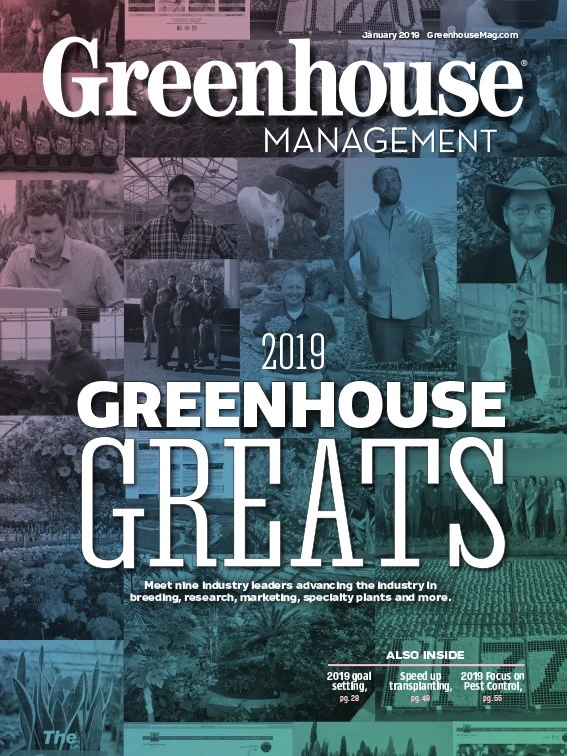
Photo: Adobe Stock

The 2018 midterm elections are behind us, and the makeup of Congress changed, but AmericanHort director of government affairs Tal Coley says the association’s goals remain the same.
“I think we’ll still be able to get a lot of things done, primarily because we have champions on both sides of the aisle,” he says. “I think as a trade association, you never want to gravitate toward one side so much so that you’re not engaging folks from the other side.”
In the U.S. House of Representatives, Democrats picked up a net gain of 40 seats, shifting control to the left.
“Whatever happens in 2020 or whatever happens in the next couple of years, I think we’re well-positioned with a Democratic house — we’ve worked well with Collin Peterson [a Democrat representing Minnesota’s 7th congressional district] who is likely to be the chair of the house agricultural committee, for instance,” Coley says. “He’s done some great stuff in the ag sphere, but also in the transportation sphere with the regulations and the electronic logging device mandate. Those lawmakers that work with both sides of the aisle — like Peterson — are the ones we rallied around.”
Below, Coley outlines the four issues he has at the top of his list to watch in 2019.

1. Labor
Tal Coley: I haven’t run into anyone who doesn’t have workforce issues on their mind. The labor issue is paramount. It’s something my colleague Craig Regelbrugge [senior vice president, public policy and government relations] works on pretty much 100 percent of the time, and he is in the weeds with that stuff. But as I see it, it’s something that with the [Trump] administration and their beliefs, and how Congress has kicked the can down the road on a lot of these things — it’s just very hard to make headway on some of the labor issues. Granted, it looks like the H-2B cap might get raised. But there are some strings attached to that, and there might be enforcement measures in place as a trade-off. On the H-2A side, I know the administration is making some changes there to make it a bit more user friendly. There’s some regulatory guidance out there on not having to put advertisements and newspapers and whatnot and doing something online or something like that. I don’t think you’ll see anything comprehensive, but even a little bit of relief on an issue like that can go a long way.
2. Transportation
TC: Transportation issues are something I’ve been really focused on. Costs are very high; availability is not as high as we’d like it. Some people are having a really hard time finding people to ship their [products]. We’ve been working on some things [including] some hours of service flexibility measures. I know the agency that’s in charge of the Federal Motor Carrier Safety Administration has proposed some tweaks to maybe add a few hours here or there and give drivers more discretion when adverse conditions hit. Is it a silver bullet to the problem? No, but every little bit helps. Will the prices come down in 2019? I guess that’s just a question of if we can find more truck drivers, right? You already have a labor shortage for people who drive trucks. And you throw a large regulatory paradigm shift on top of that with the electronic logging device (ELD) mandate, and you have the perfect storm in 2018. In 2019, people are a bit more used to it. They are still adjusting, but the agency itself is still out there 11, 12 months later and still trying to explain a lot of the rules and regulations. So, there’s still a lot of confusion with that.
There’s also the agricultural exemption [for trucking]. We’re very vocal on that right now because it’s another mitigating type of exemption that can help businesses. If you operate within a 150-mile radius around an agricultural source, that time does not count toward your daily and weekly hour limits. Right now, we’re kind of in a gray area. The definition that they use for this ag exemption is very vague. Some in our industry are using the ag exemption, and I haven’t heard any news about getting large amounts of citations. But when we meet officials at the Federal Motor Carrier Safety Administration, they are adamant that we are not included in that exemption. So, I think for peace of mind on our end, and to leave no room for interpretation by enforcement officials, it is essential that we get it spelled out that we are included in that exemption.

3. Environmental issues
TC: There’s a lot of action going on with pesticides, and you’re seeing lawsuits and court rulings that I think are going to continue into 2019. There are products that we feel are environmentally safe and good for the industry, and we need to fight for them. And a lot of that action is at the state level, but there are a lot of federal [directives] going on with the EPA. I think we are going to focus on that area.
4. Taxes
TC: With the tax bill that was passed [in 2017], this will be the first tax season where a lot of people will be able to utilize some of the new rules, and it’ll be interesting to see how those play out. I know the IRS is writing new regulations when it comes to that. That’s always where the devil in the details matters — the bill says one thing, but the agency interprets it another way and that it doesn’t come out the way it was intended to. Small business issues are on the agenda too. And there’s always an issue or two that you’re not prepared for, that comes out of nowhere. For instance, the trucking issue was one for us.

Explore the January 2019 Issue
Check out more from this issue and find your next story to read.
Latest from Greenhouse Management
- Anthura acquires Bromelia assets from Corn. Bak in Netherlands
- Top 10 stories for National Poinsettia Day
- Langendoen Mechanical hosts open house to showcase new greenhouse build
- Conor Foy joins EHR's national sales team
- Pantone announces its 2026 Color of the Year
- Syngenta granted federal registration for Trefinti nematicide/fungicide in ornamental market
- A legacy of influence
- HILA 2025 video highlights: John Gaydos of Proven Winners





